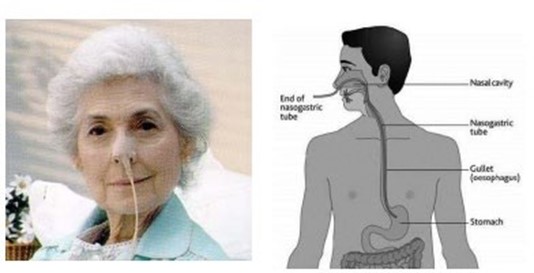A patient admitted with a peptic ulcer has a nasogastric (NG) tube in place. When the patient develops sudden, severe upper abdominal pain, diaphoresis, and a firm abdomen, which action should the nurse take?
Irrigate the NG tube.
Elevate the foot of the bed.
Give the ordered antacid.
Check the vital signs.
The Correct Answer is D
The nurse should quickly assess the patient's vital signs to check for signs of shock and instability. If the vital signs are unstable, the nurse should initiate appropriate interventions to stabilize the patient, such as administering oxygen, starting IV fluids, and providing continuous cardiac monitoring. Based on the sudden onset of severe upper abdominal pain, diaphoresis, and a firm abdomen, the nurse should suspect a possible perforation or bleeding related to the peptic ulcer. This is a medical emergency that requires immediate intervention. Therefore, the nurse should prioritize notifying the healthcare provider and preparing the patient for urgent medical evaluation.
Option A, irrigating the NG tube, is not appropriate in this situation and may further exacerbate the patient's condition if the ulcer has perforated.
Option B, elevating the foot of the bed, is also not appropriate as it does not address the patient's current symptoms.
Option C, giving the ordered antacid, may not be effective in addressing the severity of the patient's symptoms and should be postponed until the healthcare provider has evaluated the patient.

Nursing Test Bank
Naxlex Comprehensive Predictor Exams
Related Questions
Correct Answer is C
Explanation
Based on the assessment findings presented, the nurse would suspect a urinary tract infection (UTI). The client's symptoms of acute confusion, urinary frequency and incontinence, and elevated WBC count with bands suggest a possible infection. Dehydration or diabetic ketoacidosis could also cause confusion and fatigue, but these conditions are less likely given the normal BMP and CBC results.
Hepatitis would not typically present with these specific symptoms.
Correct Answer is B
Explanation
IV fluids are not typically used as a treatment for UTIs (urinary tract infections) as they do not directly address the infection itself. The main reason for administering IV fluids to a patient with a UTI would be to ensure adequate hydration, especially if the patient is experiencing fever or other symptoms of dehydration. Adequate hydration can also help improve the efficacy of antibiotics in treating the infection by ensuring that the urinary system is properly functioning and able to flush out bacteria.
Therefore, option b would be the closest answer as IV fluids may be given to facilitate the administration of IV antibiotics. However, it is important to note that antibiotics are the primary treatment for UTIs, and IV fluids are usually given as a supportive measure to ensure the patient's overall well-being. Flushing bacteria from the urinary tract or diluting bacteria are not considered primary rationales for administering IV fluids in a patient with a UTI. Relief of pain and discomfort may be managed with pain medication, but this is not the primary reason for IV fluid administration.
Whether you are a student looking to ace your exams or a practicing nurse seeking to enhance your expertise , our nursing education contents will empower you with the confidence and competence to make a difference in the lives of patients and become a respected leader in the healthcare field.
Visit Naxlex, invest in your future and unlock endless possibilities with our unparalleled nursing education contents today
Report Wrong Answer on the Current Question
Do you disagree with the answer? If yes, what is your expected answer? Explain.
Kindly be descriptive with the issue you are facing.
